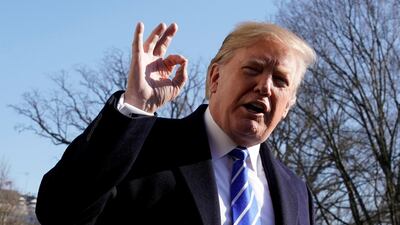Lies are not unknown in diplomacy, but Donald Trump is blazing a new trail. He is exploring whether lying can be the central organising principle of a foreign policy.
Mr Trump's most recent lie was a doozy. On December 6, he announced that he was breaking with two decades of United States presidential policy by recognising Jerusalem as Israel's capital and moving the US embassy there. He also said the move was "not intended, in any way, to reflect a departure from our strong commitment to facilitate a lasting peace agreement".
The move triggered outrage across the Middle East, turmoil and criticism that continue to this day. It has led the Palestinians to refuse to meet US vice president Mike Pence on his upcoming visit. It has provoked condemnation from America's allies and from the 14 other members of the UN Security Council besides the US.
Perhaps this unrest would be warranted if it were part of a greater strategy, if there were a clear plan. As Thomas Friedman of The New York Times noted, perhaps it would have been worthwhile if the US had gained something in exchange for the recognition.
But there is no strategy. There were no gains. There was only violence and a message to the Palestinians and the rest of the world that the US was incapable of playing the role of honest broker in advancing the long-sought goal of a solution to the Israeli-Palestinian conflict.
But it is worse than that because none of what Mr Trump said was actually true. In other words, the setbacks that the region and US standing in the region have just incurred were for nothing. They were all just part of an empty political stunt.
___________________
Read more on Jerusalem in Opinion
The US president cannot ignore the region's reaction to his Jerusalem decision
With the stability of the region at stake, Palestinians deserve a united front
___________________
This became apparent very rapidly. Within hours of the announcement of Mr Trump’s decision, the president, like his recent predecessors, signed a waiver postponing the US move another six months. Then the state department announced that it would not acknowledge in official documents that those born in Jerusalem were actually born in Israel. Following that, beleaguered US secretary of state Rex Tillerson announced that the embassy move would not happen for a long time and certainly not in 2018.
With the US president's future in real doubt and the potential for the 2018 US congressional elections to tip the balance in one or both houses of Congress from the Republicans to the Democrats, saying something won't happen until after 2018 is like saying it might never happen. And indeed, there are plenty of reasons to believe that Trump, just like previous presidents, will continue to kick the can down the road for the remainder of his presidency (especially as the job security of his most active pro-Israel adviser, son-in-law Jared Kushner, increasingly seems in jeopardy).
So, the break with past presidents was a lie. The announcement of a move was a lie. And most disturbingly, of course, the assertion that there was a "strong commitment to facilitate a lasting peace agreement" was also a lie. It had to be because there is no sign of such a commitment, no strategy, no progress and no rationale by which revealing a bias can be seen as evidence of such a commitment.
By lying about all these other things and inflaming the Arab world, Mr Trump will soon be revealed to the hard-right supporters of Israel in his political base (the audience for whom this charade was intended) and his counterpart in the Israeli government to have been all talk and no action.
______________________
Read more from Opinion
The Syrian regime has made many gains this year, but it is too early to tell whether it's game over
Vision 2021 sends a strong message to enhance skills and find local talent
The quest for a 'United States of Europe' exemplifies the EU elite's contempt for people's wishes
______________________
Some in the US see this as part of another disturbing pattern, one in which the president offers up high profile – and often extreme – policy pronouncements that cabinet agencies then either ignore or try to undo, such as his threats of war with North Korea. This reveals another essential lie of the Trump presidency, the one in which he asserts he is "the only one who matters". Actually, as the world is increasingly discovering, if the words of the US government (Trump's) and its actions are disconnected, the words become meaningless.
This is not true in every area. On trade deals, for example, Mr Trump's rhetoric has translated into damaging action by the US. But take the Paris climate accord. It is still unclear whether the US is out or whether it even can be. On Russia, the president talks one kind of relationship but the US Congress seeks another. Who will prevail here is also unclear.
In diplomacy, of course, words matter. Mr Trump’s lies and overstatements about issues of war and peace, alliances and the international system, his power and the US government’s plans all have major consequences, but beware. The words themselves do not mean what you might think. And sometimes, seemingly as a matter of policy, they mean the opposite of what they seem to be saying.
David Rothkopf is CEO of The Rothkopf Group, senior fellow at the Johns Hopkins School of Advanced International Studies, a visiting scholar at the Carnegie Endowment for International Peace and most recently author of The Great Questions of Tomorrow

